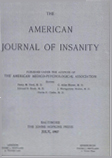VARIABILITY OF MENTAL RATINGS IN RETESTS OF NEUROPSYCHIATRIC CASES
Abstract
To summarize—this study shows that the variability of mental ratings in adult neuropsychiatric cases is much greater than the variability found in normal school children, and is considerably greater than that found in the children used in this study. Part of this difference is probably due to the fact that most of the adults had mental disturbances of psychotic degree, while the disturbances in the children were of a different type—namely, behavior problems, and various mild neurotic manifestations. Of all the cases with organic diseases, causing physiological and mental deterioration, the variability was greatest in the adults and there were likewise more adults with organic as well as functional disturbances. This was further emphasized by the brief supplementary study of the 10 cases of general paresis. Age and level of I. Q. were not found to be important factors in variability in this series of cases. In the adult group the women varied more than the men while in the group of children the boys varied more than the girls. The extent of the variability in mental ratings is of much value to the psychiatrist in determining the progression toward normality or increased abnormality. When thought of in this light retests not only aid in judging the mental level, but become a type of barometer indicating the upward or downward trend of mental functioning.
Access content
To read the fulltext, please use one of the options below to sign in or purchase access.- Personal login
- Institutional Login
- Sign in via OpenAthens
- Register for access
-
Please login/register if you wish to pair your device and check access availability.
Not a subscriber?
PsychiatryOnline subscription options offer access to the DSM-5 library, books, journals, CME, and patient resources. This all-in-one virtual library provides psychiatrists and mental health professionals with key resources for diagnosis, treatment, research, and professional development.
Need more help? PsychiatryOnline Customer Service may be reached by emailing [email protected] or by calling 800-368-5777 (in the U.S.) or 703-907-7322 (outside the U.S.).



